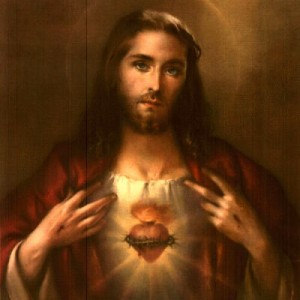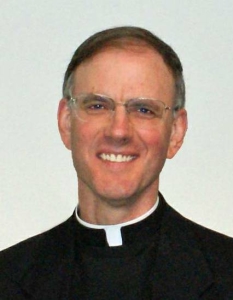Podcast: Play in new window | Download (Duration: 5:54 — 4.1MB) | Embed
Subscribe: Apple Podcasts | Spotify | Amazon Music | Android | Pandora | iHeartRadio | JioSaavn | Podchaser | Gaana | Podcast Index | Email | TuneIn | Deezer | Anghami | RSS | More
 With the greatest confidence I come to you, the fatherly Heart of Jesus for I know that no father, were he ever so loving and solicitous, can possibly love his children as you have always loved me. To whom, therefore, shall I go if not to you the best of fathers and the author of all good? It is indeed true that I have grievously offended you, that I have neglected to honor you properly and have been guilty of ingratitude and do not deserve to be numbered among your children. But although I forgot my duty to you as your child I know that you are still my beloved Father in heaven.
With the greatest confidence I come to you, the fatherly Heart of Jesus for I know that no father, were he ever so loving and solicitous, can possibly love his children as you have always loved me. To whom, therefore, shall I go if not to you the best of fathers and the author of all good? It is indeed true that I have grievously offended you, that I have neglected to honor you properly and have been guilty of ingratitude and do not deserve to be numbered among your children. But although I forgot my duty to you as your child I know that you are still my beloved Father in heaven.
Now with a contrite heart I kneel at your feet weeping over my sins and promising you that in the future I shall make every effort never to offend you again. I hope in spite of my sinfulness to be received by you who have so often sought me.
O sweetest Heart of Jesus help me with your grace so that I may carry out my resolution. Then, O Jesus, if my wishes are not contrary to your most holy will, I beg of you (mention your request) for which I pray with confidence and hope to receive from your infinite goodness.
———————
O Divine Jesus who has said, “Ask and you shall receive; seek and you shall find, knock and it shall be opened to you,” behold me prostrate at your feet. Animated with a lively faith and confidence in the promises dictated by your Sacred Heart and pronounced by your adorable lips. I come to ask your aid. (mention your request)
From whom shall I ask, O sweet Jesus, if not from you whose heart is an inexhaustible source of all graces and merits? Where shall I seek if not from the treasure which contains all the riches of your clemency and bounty? Where shall I knock if it be not at the door of your Sacred Heart through which God himself comes to us and through which we go to God?
To you then, O Heart of Jesus, I have recourse. In you I find consolation when afflicted, protection when persecuted, strength when overwhelmed with trials and light in doubt and darkness. I firmly believe you can bestow on me the grace I implore even though it should require a miracle. You have only to will it and my prayer will be granted. I know I am most unworthy of your favors, O Jesus, but this is not a reason for me to be discouraged. You are the God of mercies and you will not refuse a contrite and humble heart. Cast upon me a look of pity, I conjure you, and your compassionate Heart will find in my miseries and weakness a pressing motive for granting my petition.
But, O Sacred Heart, whatever may be your decision with regard to my request I will never cease to adore, love, praise and serve you. Deign, O Jesus, to accept my act of perfect submission to the decrees of your adorable Heart which I sincerely desire may be fulfilled in and by me and all your creatures forever and ever. Amen.
Act of Consecration to the Sacred Heart of Jesus
Most sweet Jesus, redeemer of the human race look down upon us humbly prostrate before your altar. We are yours and yours we wish to be but to be more surely united with you behold each one of us freely consecrates himself today to your most Sacred Heart. Many indeed have never known you, many too, despising your precepts have rejected you. Have mercy on them all, most merciful Jesus, and draw them to your Sacred Heart.
Be you king, O Lord, not only of the faithful who have never forsaken you but also of the prodigal children who have abandoned you. Grant that they may quickly return to their Father’s house lest they die of wretchedness and hunger.
Be you King of those who are deceived by erroneous opinions or whom discord keeps aloof and call them back to the harbor of truth and the unity of faith so that soon there may be but one flock and one shepherd.
Grant O Lord, to your Church assurance of freedom and immunity from harm. Give peace and order to all nations and make the earth resound from pole to pole with one cry: Praise to the Divine Heart that wrought our salvation; to it be glory and honor forever. Amen.

 Episode 11 -The Way of Mystery: The Eucharist and Moral Living– The Liturgy of the Eucharist part 3: The Eucharistic Prayer…God teaching us to pray. What are we doing in our participation and are we truly ready to receive the Body of Christ? Should we, in integrity, receive the Truth of Christ in Communion…do we really believe?
Episode 11 -The Way of Mystery: The Eucharist and Moral Living– The Liturgy of the Eucharist part 3: The Eucharistic Prayer…God teaching us to pray. What are we doing in our participation and are we truly ready to receive the Body of Christ? Should we, in integrity, receive the Truth of Christ in Communion…do we really believe?



 Fr. Gallagher continues to discuss the fifth step – RENEWAL – which is how we move forward after our encounter with God in our prayer.
Fr. Gallagher continues to discuss the fifth step – RENEWAL – which is how we move forward after our encounter with God in our prayer.

